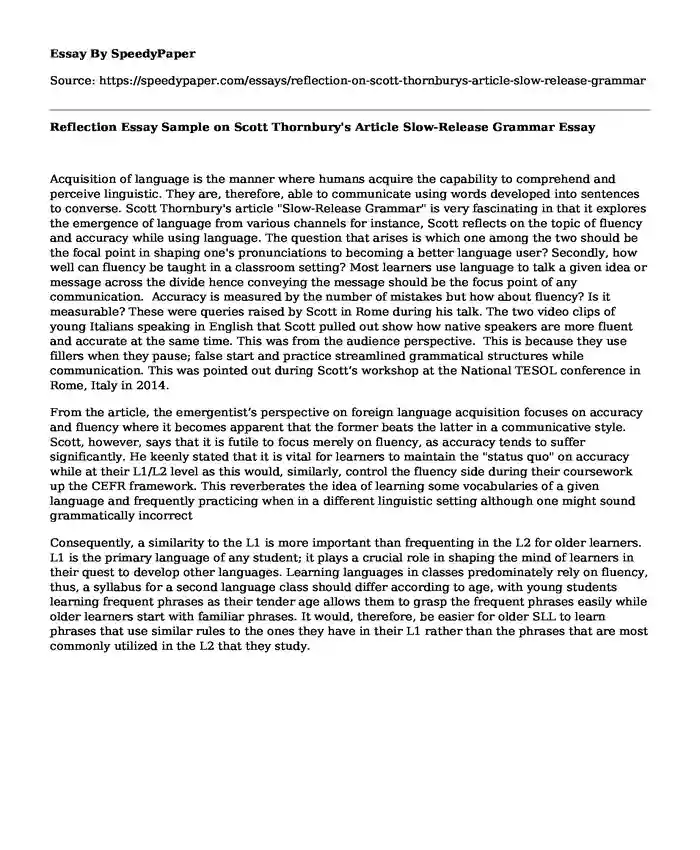
| Type of paper: | Essay |
| Categories: | Reflection Languages |
| Pages: | 2 |
| Wordcount: | 461 words |
Acquisition of language is the manner where humans acquire the capability to comprehend and perceive linguistic. They are, therefore, able to communicate using words developed into sentences to converse. Scott Thornbury's article "Slow-Release Grammar" is very fascinating in that it explores the emergence of language from various channels for instance, Scott reflects on the topic of fluency and accuracy while using language. The question that arises is which one among the two should be the focal point in shaping one's pronunciations to becoming a better language user? Secondly, how well can fluency be taught in a classroom setting? Most learners use language to talk a given idea or message across the divide hence conveying the message should be the focus point of any communication. Accuracy is measured by the number of mistakes but how about fluency? Is it measurable? These were queries raised by Scott in Rome during his talk. The two video clips of young Italians speaking in English that Scott pulled out show how native speakers are more fluent and accurate at the same time. This was from the audience perspective. This is because they use fillers when they pause; false start and practice streamlined grammatical structures while communication. This was pointed out during Scott’s workshop at the National TESOL conference in Rome, Italy in 2014.
From the article, the emergentist’s perspective on foreign language acquisition focuses on accuracy and fluency where it becomes apparent that the former beats the latter in a communicative style. Scott, however, says that it is futile to focus merely on fluency, as accuracy tends to suffer significantly. He keenly stated that it is vital for learners to maintain the "status quo" on accuracy while at their L1/L2 level as this would, similarly, control the fluency side during their coursework up the CEFR framework. This reverberates the idea of learning some vocabularies of a given language and frequently practicing when in a different linguistic setting although one might sound grammatically incorrect
Consequently, a similarity to the L1 is more important than frequenting in the L2 for older learners. L1 is the primary language of any student; it plays a crucial role in shaping the mind of learners in their quest to develop other languages. Learning languages in classes predominately rely on fluency, thus, a syllabus for a second language class should differ according to age, with young students learning frequent phrases as their tender age allows them to grasp the frequent phrases easily while older learners start with familiar phrases. It would, therefore, be easier for older SLL to learn phrases that use similar rules to the ones they have in their L1 rather than the phrases that are most commonly utilized in the L2 that they study.
Cite this page
Reflection Essay Sample on Scott Thornbury's Article Slow-Release Grammar. (2017, Oct 01). Retrieved from https://speedypaper.net/essays/reflection-on-scott-thornburys-article-slow-release-grammar
Request Removal
If you are the original author of this essay and no longer wish to have it published on the SpeedyPaper website, please click below to request its removal:
- Free Essay: Chapter 3 Methodology of the Oral Delivery of Therapeutic Proteins and Peptides Research
- Free Essay on Developing a Sustainable City Model for Port Louis
- Free Essay Sample about Hospital-acquired Pressure
- Essay Example with Annotated Bibliography on Bahamas and Haiti's Health Care Systems
- Apple Industry Essay Example
- Literary Essay Sample: Grapes of Wrath by John Steinbeck, Chapters 17 to 30 Response
- Essay Sample on Supply and Demand in American Auto Industry
Popular categories




